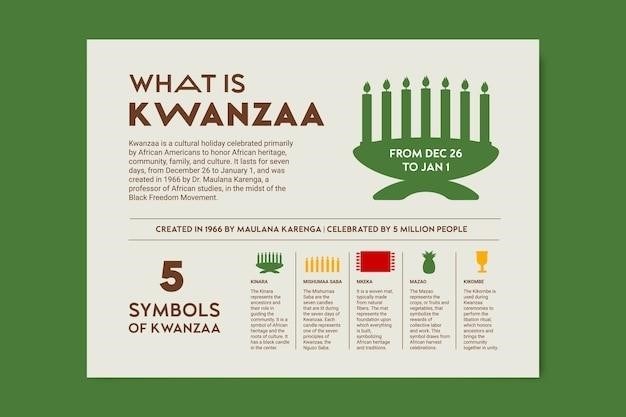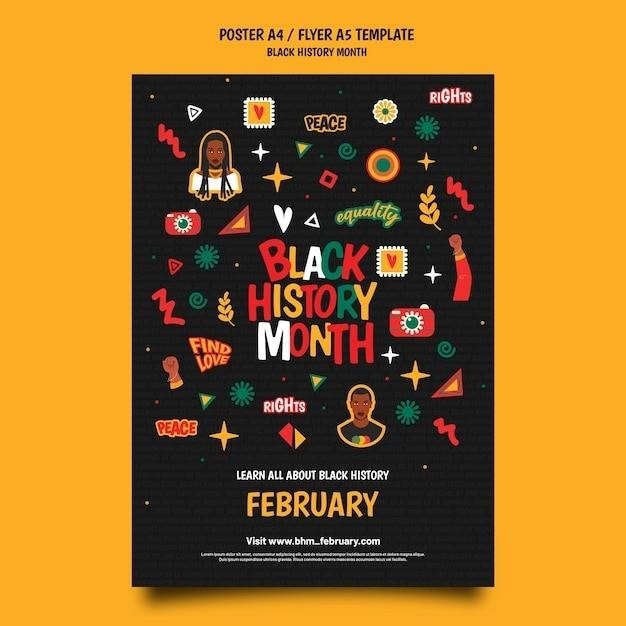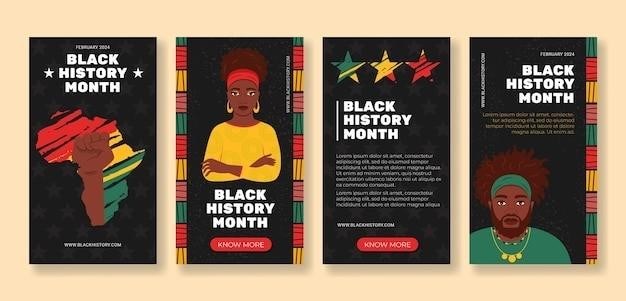Black History Trivia⁚ A Comprehensive Guide
This guide offers a comprehensive collection of Black history trivia questions and answers in a readily accessible PDF format. These PDFs are valuable educational tools, perfect for diverse settings, from classrooms to family game nights. They cover various difficulty levels, ensuring engagement for all ages.
Black History Trivia Questions and Answers PDFs offer a convenient and engaging way to learn about significant figures and events in African American history. These digital resources provide a diverse range of questions, catering to various age groups and knowledge levels. From elementary-level inquiries about prominent figures like Jackie Robinson to more challenging questions delving into lesser-known historical events, these PDFs offer a dynamic learning experience. The printable format allows for easy distribution and use in classrooms, homes, community centers, or any setting where interactive learning is desired. The versatility of PDFs makes them ideal for both individual study and group activities, fostering a deeper understanding and appreciation of Black history. The readily available nature of these resources ensures widespread accessibility, promoting inclusivity and knowledge-sharing. The diverse question categories and difficulty levels ensure that everyone can participate and learn something new, making them a valuable tool for education and entertainment. Whether used for quizzes, game nights, or educational enrichment, these PDFs serve as effective tools for celebrating Black history and promoting cultural awareness.
The Value of Black History Trivia PDFs for Education
Black History Trivia PDFs offer invaluable benefits for educators seeking engaging and effective methods to teach about African American history. These resources transcend traditional lectures, transforming learning into an interactive and enjoyable experience. The diverse question formats, ranging from easy to challenging, cater to different learning styles and knowledge levels within a classroom. The readily accessible PDF format facilitates easy distribution and integration into lesson plans, allowing for flexibility and adaptability. Furthermore, these PDFs can spark meaningful discussions and critical thinking among students. By encouraging research and collaborative learning, they promote a deeper understanding of the historical context surrounding each question. The use of trivia can also help alleviate the pressure often associated with traditional assessments, creating a more positive and inclusive learning environment where students feel comfortable participating. This approach promotes active learning and knowledge retention, making Black history more relatable and memorable for students of all ages. The supplemental nature of these PDFs allows educators to enhance existing curriculum and provide a dynamic learning experience.
Utilizing Black History Trivia PDFs in Different Settings
The versatility of Black History trivia PDFs extends beyond the classroom. Families can utilize them for engaging educational game nights, fostering bonding experiences while learning about significant historical figures and events. Community centers and libraries can host trivia nights, promoting social interaction and community engagement around Black history. Businesses can incorporate these PDFs into diversity and inclusion training programs, enhancing employee understanding and appreciation of African American contributions. Furthermore, these PDFs are adaptable for various age groups, with questions tailored for elementary, middle, and high school students, as well as adults. They can be integrated into presentations or used as standalone activities, adding an interactive element to workshops and lectures on Black history. The printable format allows for easy adaptation; PDFs can be modified to suit specific audiences and themes, ensuring relevance and engagement. Their digital nature simplifies distribution, making them accessible to a wide range of individuals and organizations. Ultimately, Black History trivia PDFs provide a flexible and impactful tool for promoting knowledge and appreciation of African American history in diverse settings.
Categories of Black History Trivia Questions
Structuring Black History trivia questions into categories enhances engagement and allows for tailored learning experiences. Categorization by difficulty level is crucial; “easy” questions might focus on widely known figures like Martin Luther King Jr. or Jackie Robinson, suitable for younger audiences or introductory learning. “Medium” difficulty questions could delve into specific events or lesser-known achievements, encouraging deeper engagement and knowledge acquisition. “Challenging” questions can explore nuanced historical contexts, complex social movements, or lesser-known individuals, providing a stimulating experience for advanced learners. Another effective approach is thematic categorization. Questions could focus on specific eras (e.g., the Harlem Renaissance, the Civil Rights Movement), fields of achievement (e.g., science, arts, sports), or geographical locations. This approach allows for a more in-depth exploration of particular aspects of Black history, fostering a richer understanding of the subject matter. Combining difficulty levels with thematic categories creates a comprehensive and adaptable trivia experience, suitable for various educational settings and learning styles.

Easy Black History Trivia Questions
Medium Difficulty Black History Trivia Questions
Medium-difficulty Black history trivia questions require a slightly deeper understanding of historical context and events. These questions move beyond simple identification and delve into the nuances of significant moments and the contributions of lesser-known figures. For example, a question might ask about the specifics of the Civil Rights Act of 1964, going beyond simply naming the act itself. Another could explore the contributions of a specific individual involved in the Harlem Renaissance, beyond simply naming the movement. The goal is to challenge participants while still remaining accessible and engaging. These questions encourage research and critical thinking, prompting a more thorough understanding of the historical narrative. The inclusion of diverse figures and events within these questions is crucial to present a comprehensive portrayal of Black history, moving beyond a limited set of familiar names and events. By incorporating various aspects of the historical timeline, from social movements to artistic achievements, these questions offer a balanced and enriching learning experience.
Challenging Black History Trivia Questions
These questions demand a sophisticated understanding of Black history, moving beyond commonly known facts and figures. They explore lesser-known events, nuanced interpretations of historical events, and the complexities of historical figures. For instance, a challenging question might delve into the specific strategies employed during the Montgomery Bus Boycott, or analyze the contrasting viewpoints on a particular historical figure. Another might focus on the impact of a lesser-known legal case on the broader Civil Rights movement. The aim is not just to test recall, but also to stimulate critical analysis and discussion. These questions require research and a deeper engagement with the subject matter, prompting a more profound understanding of Black history’s multifaceted nature. Such questions also encourage exploration beyond the standard narrative, highlighting less-discussed aspects and fostering a more comprehensive appreciation of the historical context. They present a stimulating challenge for those already familiar with the subject, encouraging further learning and exploration.
Finding Reliable Black History Trivia PDFs Online
Locating dependable Black history trivia PDFs online requires careful consideration. Reputable educational websites, museums dedicated to Black history, and established educational organizations often offer free downloadable resources. These sources generally prioritize accuracy and provide detailed citations or references. However, caution is advised when using less-known sources. Always scrutinize the information presented and cross-reference with established historical accounts. Be wary of sites with overt biases or a lack of transparency regarding their sources. Look for PDFs that clearly cite their sources and offer comprehensive answers, not just simple yes/no responses. A well-constructed PDF will present questions with varying difficulty levels, catering to diverse audiences. Checking the author’s credentials and the website’s reputation is crucial in ensuring accuracy and reliability. Consider using multiple sources to cross-verify information and gain a well-rounded understanding of the topic. Remember, responsible fact-checking is paramount when utilizing online resources for educational purposes.
Creating Your Own Black History Trivia PDF
Crafting your own Black history trivia PDF allows for personalized content and targeted learning experiences. Begin by selecting a specific theme or era within Black history to focus your questions. Thorough research is crucial; utilize reputable sources such as academic journals, biographies of prominent figures, and historical archives. Ensure accuracy by cross-referencing information from multiple sources. Structure your trivia questions in a clear and concise manner, avoiding ambiguity. Categorize questions by difficulty level (easy, medium, challenging) for a diverse range of players. Include a comprehensive answer key at the end of the PDF for easy grading and self-assessment. Employ a visually appealing layout with clear headings and formatting for readability. Consider incorporating images or relevant multimedia elements to enhance engagement. Utilize readily available PDF creation software, such as Adobe Acrobat or free online tools, to compile your questions, answers, and visuals into a professional-looking document. Remember to always cite your sources correctly to ensure academic integrity and avoid plagiarism. Distribute your PDF responsibly, ensuring its use aligns with educational and ethical standards.
Incorporating Images and Multimedia into Your PDF
Elevating your Black history trivia PDF from a simple text document to an engaging multimedia experience significantly enhances learning and enjoyment. Strategically incorporate relevant images, such as portraits of significant figures or photographs depicting pivotal historical events. Ensure high-resolution images for optimal clarity. Use images sparingly to avoid overwhelming the reader and maintain a clear focus on the trivia questions. Consider adding short audio clips of speeches or songs from relevant historical periods. These audio elements can provide a richer context to the trivia, enhancing understanding and memorability. If feasible, embed short video clips showcasing historical moments or interviews with key figures. However, ensure videos are concise and directly related to the questions to avoid disrupting the flow. Always obtain necessary permissions before using copyrighted material, including images, audio, and video clips. Properly cite all sources to maintain academic integrity. Test the functionality of your multimedia elements to ensure they play correctly on various devices and platforms before distributing your PDF. A well-designed and engaging multimedia PDF can transform a simple trivia game into a captivating and educational experience.
Tips for Engaging Trivia Nights
Transforming your Black History trivia PDF into a lively and memorable trivia night requires careful planning and execution. Begin by selecting an appropriate venue with sufficient seating and space for teams. Ensure adequate lighting and sound equipment for smooth question delivery and scorekeeping. Create a welcoming atmosphere with decorations related to Black history and culture. Divide participants into teams for friendly competition, encouraging teamwork and collaboration. Employ a variety of question types—multiple-choice, true/false, and open-ended—to cater to different learning styles and keep participants engaged. Incorporate visual aids such as images or short video clips to enhance engagement and understanding. Consider incorporating team-based challenges or bonus rounds to add excitement. Use a clear and engaging presentation style, keeping the pace brisk but not rushed. Provide periodic breaks to allow participants to socialize and network. Offer small prizes or recognition for winning teams to incentivize participation and foster a sense of accomplishment. Remember to keep the atmosphere lighthearted and fun, emphasizing learning and celebration over intense competition. Most importantly, ensure everyone leaves feeling enriched by their participation in this celebration of Black history.
Black History Trivia for Different Age Groups
Crafting effective Black History trivia PDFs requires careful consideration of the target audience’s age and knowledge level. For elementary school children, focus on simpler questions about well-known figures like Martin Luther King Jr. or Rosa Parks, using visuals and relatable anecdotes. Incorporate interactive elements like matching games or fill-in-the-blanks. For middle schoolers, introduce more complex questions encompassing broader historical events and achievements, encouraging critical thinking. Include a mix of multiple-choice, true/false, and short-answer questions. High school students can engage with more in-depth questions requiring analysis and interpretation of primary and secondary sources. Explore diverse themes like the Harlem Renaissance, the Civil Rights Movement, and contemporary Black contributions. Consider incorporating debates or research projects alongside the trivia. For adult audiences, delve into nuanced topics, including lesser-known historical figures and complex social issues. Challenge participants with open-ended questions promoting discussion and critical analysis. Consider themed trivia nights focusing on specific eras or movements within Black history. Remember to always adapt the complexity and content to suit the age group, ensuring an engaging and educational experience for all.

The Significance of Black History Month
Black History Month, observed annually in February, holds profound significance as a dedicated period for recognizing the contributions and achievements of Black individuals throughout history. It’s a time to celebrate the rich tapestry of Black culture, from the arts and sciences to social justice movements and political activism. Beyond mere celebration, Black History Month serves as a powerful tool for education and reflection, prompting crucial conversations about systemic racism, inequality, and the ongoing fight for civil rights. Utilizing Black History trivia PDFs during this month amplifies its educational impact, allowing for interactive learning and the dissemination of knowledge across various age groups and settings. Trivia questions can effectively highlight lesser-known figures and events, enriching the understanding of this crucial part of American history. The accessibility of PDFs further enhances the reach and impact of this educational initiative, making it readily available to individuals and communities seeking to deepen their understanding of Black history and culture. Incorporating trivia into Black History Month celebrations is a dynamic way to engage diverse audiences and promote meaningful discussions about the past, present, and future of racial equality.
Beyond Trivia⁚ Deeper Exploration of Black History
While Black history trivia PDFs offer an engaging entry point into learning about significant figures and events, they serve as a springboard for more profound exploration. The questions themselves should spark curiosity, leading individuals to seek out more in-depth information about the topics covered. This could involve researching the lives and accomplishments of prominent figures, delving into pivotal historical moments, or examining the lasting impact of social movements. Utilizing libraries, online archives, and reputable historical resources allows for a richer understanding of the complexities and nuances of Black history. Engaging with primary sources, such as letters, diaries, and photographs, provides a more intimate and nuanced perspective. Beyond the facts and figures, exploring the social, political, and economic contexts surrounding historical events fosters a more critical and comprehensive understanding. Black History Month, while important, should not be the only time to engage with this rich history. Continuous learning and exploration ensure that the stories and contributions of Black individuals are consistently acknowledged, appreciated, and incorporated into a broader understanding of history.
